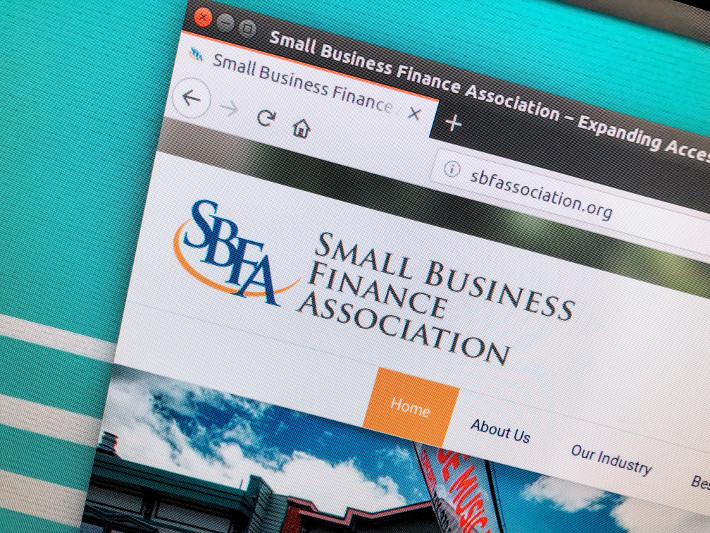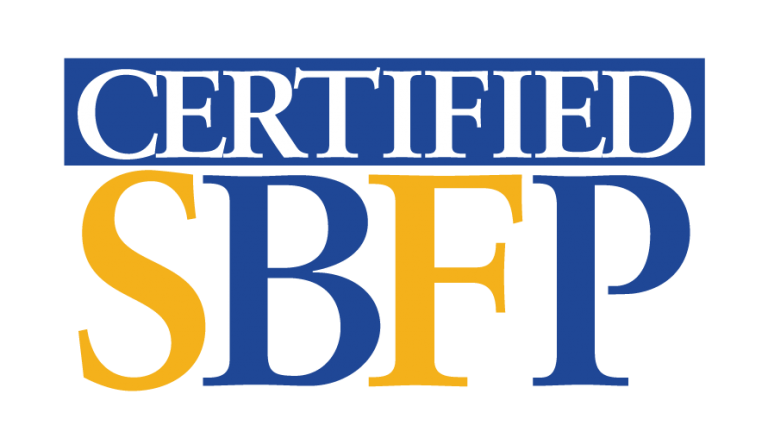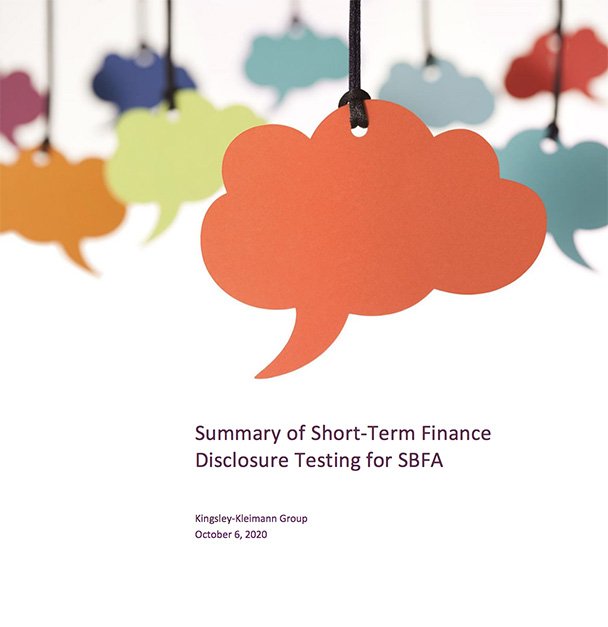 |
Related Headlines
| 01/02/2024 | SBFA appeals CA decision |
| 05/23/2019 | BFS Capital a member of both ILPA & SBFA |
| 01/11/2019 | SBFA Broker Council announced board |
| 03/22/2018 | SBFA braved blizzard for DC fly-in |
Stories
SBFA Appeals Decision in Disclosure Law Lawsuit
January 2, 2024The Small Business Finance Association will appeal the decision issued in its case against the California DFPI over the legality of its disclosure laws.
The SBFA filed its suit in December 2022, alleging that the disclosure laws in California violated the First Amendment and that they were pre-empted by a federal law (TILA) that governs APR calculations. After the Court initially allowed the case to proceed in March 2023, it reversed course and dismissed the SBFA’s lawsuit in December.
On December 29, the SBFA filed its notice of appeal to the United States Court of Appeals for the Ninth Circuit.
Federal Judge: Legal Challenge to California’s Commercial Financing Disclosure Law Has Merit, Orders SBFA Case to Proceed
April 3, 2023 A federal judge has ordered the Small Business Finance Association’s (SBFA) case against Clothilde Hewlett in her capacity as Commissioner of the California Department of Financial Protection & Innovation (DFPI) to proceed. On March 30, The Honorable R. Gary Klausner denied defendant’s motion to dismiss the claims that the State’s commercial financing disclosure law is both unconstitutional and preempted by the federal Truth in Lending Act (TILA).
A federal judge has ordered the Small Business Finance Association’s (SBFA) case against Clothilde Hewlett in her capacity as Commissioner of the California Department of Financial Protection & Innovation (DFPI) to proceed. On March 30, The Honorable R. Gary Klausner denied defendant’s motion to dismiss the claims that the State’s commercial financing disclosure law is both unconstitutional and preempted by the federal Truth in Lending Act (TILA).
The case, originally filed on December 2, 2022, argued, broadly speaking:
- That the regulations violate the First Amendment on the premise that they compel the group’s members to make inaccurate disclosures to customers while at the same time prohibiting members from engaging in communications that could be used to clarify or correct the required false or misleading information to customers.
- That APR is defined and governed at the federal level by TILA and that California’s own customized spin on it would only serve to confuse customers.
The Court has now ruled that these claims have been sufficiently alleged, allowing the SBFA the opportunity to prove its case.
Steve Denis, the Executive Director of the SBFA, told deBanked that the win at this juncture was validation for what the organization has been saying for the past few years.
“I think [this victory] is really good news. It’s a lawsuit that the entire industry should be behind,” he said.
The outcome of the case could have far reaching effects. New York, for example, has enacted similarly misleading APR rules that are soon slated to go into effect while other states have contemplated following in its footsteps.
“I think if we win this lawsuit the APR argument is over,” Denis said.
To that end, anyone in the industry that would like further information about what’s taking place can contact Denis at sdenis@sbfassociation.org.
SBFA Launches Industry Certification for Small Business Finance Providers
November 16, 2021 Washington, D.C.— The Small Business Finance Association (SFBA) today launched a new certification for the small business finance industry. The Certified Small Business Finance Professional (CSBFP) program will bring education and accountability to all providers of alternative finance products. The certification will require applicants complete a four-section training course, abide by industry best practices, provide industry references, pass an exam and be subject to a background check. The certification will also require applicants to complete continuing education classes every two years.
Washington, D.C.— The Small Business Finance Association (SFBA) today launched a new certification for the small business finance industry. The Certified Small Business Finance Professional (CSBFP) program will bring education and accountability to all providers of alternative finance products. The certification will require applicants complete a four-section training course, abide by industry best practices, provide industry references, pass an exam and be subject to a background check. The certification will also require applicants to complete continuing education classes every two years.
“This certification is a message to our customers that we want them to feel confident they are being offered fair capital options from responsible lenders,” said Steve Denis, the executive director of SBFA. “There are countless companies offering a proliferation of products and services and we believe it’s business owners deserve the comfort of knowing they are working with a certified professional.”
The certification will require applicants to complete a course centered on understanding products, laws governing the industry and compliance. The certification exam will focus on testing applicants’ ability to understand key concepts and best practices. Those who become certified will be allowed to use CSBFP branding in their marketing materials, have access to key regulatory updates and gain entry to a networking platform that will allow them to connect to industry and legal professionals.
“Our goal is to offer a fully immersive experience for certified professionals. We don’t simply want to give them a stamp but provide them a way to connect, learn and grow beyond the initial education process. It’s in the interest of our industry to offer best-in-class professionals, but more importantly, it’s in the interest of better serving our small business customers,” said Denis.
The certification is open to anyone working in the alternative small business finance industry. Interested professionals can learn more at www.csbfp.org or www.sbfassociation.org.
Contact:
Steve Denis 202.213.9506
sdenis@sbfassociation.org
Steve Denis, SBFA on Why Maryland MCA Bill Failed
March 22, 2021 “In a lot of these places, a lot of the bills are well intended, believe it or not,” Steve Denis, executive director of the Small Business Finance Association, said. “Legislators just don’t understand enough about our industry to understand the nuances. We’ve worked really hard educating policymakers in Maryland, and frankly, they now understand our industry better.”
“In a lot of these places, a lot of the bills are well intended, believe it or not,” Steve Denis, executive director of the Small Business Finance Association, said. “Legislators just don’t understand enough about our industry to understand the nuances. We’ve worked really hard educating policymakers in Maryland, and frankly, they now understand our industry better.”
Denis was referring to the nearly unanimous canning of Maryland’s MCA “Prohibition” bill last week. The bill failed to get enough support to leave the committee, blocked by a 19 to 3 vote against bringing the law out to the House floor. Denis, a proponent of the MCA and alt financing industry for years, said it was due to legislators understanding the need for capital “out there during the pandemic” and how harmful an APR cap could be for both business owners and the broker industry.
The law was originally proposed last year before covid shutdowns, but that also failed to make it to the floor. It now appears to be an annual event.
“Our goal as an organization is to make sure that small businesses have access to all different types of financial products and that we believe that small businesses are in the best position to make good decisions for their businesses,” Denis said. “The bill in Maryland narrowly targeted MCA products, and as you know and a lot of folks in the industry know, that sometimes MCA is in the best interest of the business, there’s a lot of benefits to an MCA.”
Denis punctuated his statement with the mantra- we were not out of the woods yet. An APR disclosure bill was just introduced in the Connecticut State Senate last month, modeled off the New York APR bill set to go into effect this year. Denis was hopeful the legislators could learn from speaking to industry interests and change their course like in Maryland.
“We are engaged, I think we’re in a good spot. With any of these bills, Maryland, Connecticut, I caution you know we’re not out of the woods yet,” Denis said. “We still want to work really closely with policymakers. We’re for meaningful disclosure, we think there needs to be some guardrails on our industry, but I think that the most important thing we can do is continue to educate folks in states.”
Steve Denis Talks About SBFA Study: APR is a Bad Metric For SMB Loan Transparency
October 19, 2020 In response to regulatory bills in California and New York that will enforce APR disclosures on small business capital providers, the Small Business Finance Association (SBFA) funded a study by Kingsley-Kleimann to find out if APR is a good metric to use for business loans.
In response to regulatory bills in California and New York that will enforce APR disclosures on small business capital providers, the Small Business Finance Association (SBFA) funded a study by Kingsley-Kleimann to find out if APR is a good metric to use for business loans.
Steve Denis, the Executive director of the SBFA, said his group supported the study because the states should test concepts with actual small business owners before passing regulation. In the NY disclosure bill awaiting signature, Denis said there was no concept testing. Some of the companies that support the bill might not have even read what it stipulates.
“You have a group of companies that are pushing these types of disclosures, for no reason other than their own self-interest,” Denis said. “We’re fine with disclosure, we are all for transparency, but it needs to be done in a way that we believe is meaningful to small business owners.”
In qualitative testing of 24 small business owners and executives who have experience taking commercial loans, the study concluded participants did not understand what APR was. The study found that the total cost of financing model was a better way to understand and compare options for their use.
“As one participant, when asked to define APR, answered: ‘I feel like you are asking a kid, why is the sky blue?’ (Participant 3, NY).” The study concluded, “In other words, [APR] is ever-present yet also inscrutable.”
Kingsley-Kleimann is a research-based organization that studies communication and disclosure for government agencies like the FTC and private or public business. Participants were selected from Califonia and NY.
Denis said that the findings show what SMB lending companies have already known- Anual Percentage Rate is not a useful metric for short term loans. Many do not know that APR represents the annualized cost of funds for the loan term, with the fees and additional costs included.
“People don’t know what APR is; it confuses them,” Denis said. “They know it’s a metric they should use, but they don’t know why. The APR is such a marketing tool now, it’s not a valuable tool.”
The study showed most respondents thought APR was the same as an interest rate. It’s not.
 Denis said using an annualized rate for shorter-term loans or SMB loans that have no ending date worsens the problems. In those cases, firms estimate an APR, and it is inaccurate.
Denis said using an annualized rate for shorter-term loans or SMB loans that have no ending date worsens the problems. In those cases, firms estimate an APR, and it is inaccurate.
“When you have a merchant cash advance, there’s no term,” Denis said. “So you have to estimate a term, and I mean that is just a recipe for fraud.”
Denis said that the firms supporting California SB1235 and the New York S 5470/A 10118-A disclosure bill and taking credit for writing the laws are the same companies that will suffer under the strict tolerance of an APR rule.
“The companies pushing this, the trade associations pushing it, they like to take credit for writing the bill in California and writing the bill in New York: I don’t even think they’ve read it,” Denis said. “It’s going to subject their own members to potentially millions if not hundreds of millions of dollars in potential liability [fines.]”
The SBFA is not against disclosure by any means, Denis said, but supported other avenues. The trade group believes knowing the total cost of a loan and the cost and timeline of payments will help protect and inform borrowers better than APR. Firms that support the disclosure bill are banking off the positive press, hoping to be seen as pro-consumer protections but forcing APR will make it harder to compare the actual value of loans, Denis said.
Denis is still optimistic that regulators will work with businesses affected by the incoming legislation. He said the NY legislature and governor’s office, as well as the California Department of Business Oversight, understand the problems of using APR.
“They’re receptive to these arguments, and they know what they’re doing,” Denis said. “The last thing they want to do is pass a bill that’s going to further confuse businesses, especially during a pandemic when businesses are relying on this capital to stay afloat.”
“A Bad Solution in Search of a Problem”: SBFA’s Response to the New York Disclosure Bill
August 6, 2020 “It’s actually shocking to me how tone deaf those who claim to represent our industry are when it comes to policy,” is how Steve Denis, Executive Director of the Small Business Finance Association, described the Innovative Lending Platform Association’s response to and influence over the drafting of bill A10118A/S5470B. Known as New York’s APR disclosure bill, S5470B has been passed by the state legislature, and if signed by Governor Cuomo, will require small business financing contracts to disclose the annual percentage rate as well as other uniform disclosures.
“It’s actually shocking to me how tone deaf those who claim to represent our industry are when it comes to policy,” is how Steve Denis, Executive Director of the Small Business Finance Association, described the Innovative Lending Platform Association’s response to and influence over the drafting of bill A10118A/S5470B. Known as New York’s APR disclosure bill, S5470B has been passed by the state legislature, and if signed by Governor Cuomo, will require small business financing contracts to disclose the annual percentage rate as well as other uniform disclosures.
Speaking to deBanked over the phone, Denis expressed disappointment with both the bill as well as comments made by ILPA’s CEO, Scott Stewart, in a recent article.
“Small businesses in New York are struggling right now,” the Director noted. “They’re waking up every single day wondering if they should even stay open or close permanently, and companies and organizations in our space are using their resources to push a disclosure bill that nobody has asked for. There’s no widespread issue with disclosure. There’s been no outpouring of complaints to regulators. No bad reviews on Trustpilot. This is a really bad solution in search of a problem. We have real problems right now, we should be coming together as an industry to help solve them. We want to make sure that capital is available to small businesses on the other side of this pandemic, and this group of tone deaf companies are spending resources trying to push a meaningless disclosure bill that’s just going to hurt the access to capital for real small businesses who are grinding and trying to figure out how to stay open. It’s unbelievable.”
The SBFA showed deBanked a list of issues and complaints made to the New York legislature regarding S5470B. According to the trade group, these were largely ignored and the bill was pushed through with the issues left in. Among these were problems relating to definitions and terms. No definition for the application process is included, nor is there one for a finance charge. As well as this, one senator was quoted using the term “double dipping” to refer to consumers refinancing debts that have prepayment penalties; which Denis said was “creating a whole new term that’s never been used or defined before, and applying it to commercial finance, something that’s never been done.”
Accompanying these complaints was one regarding how APR is calculated, as S5470B includes two different calculations for this, producing different results while not clearly defining when to use each.
 When asked why he believes these issues were allowed to remain in the language of the bill, Denis was baffled.
When asked why he believes these issues were allowed to remain in the language of the bill, Denis was baffled.
“I think that the companies and organizations that support this legislation don’t fully understand what’s actually in the bill. […] They have no problem pounding the table and taking credit for its passage, but I guess they don’t realize it will subject them and the rest of the alternative finance industry to massive liability, massive fines—upwards of billions of dollars worth of fines.”
Denis’s fear going forward is that funders in New York will tighten up their channels going forward or cease funding entirely, given the increased riskiness of funding under the terms of S5470B if Cuomo signs it into law. Before that happens though, the Director mentioned that he believes there will be legal challenges to the bill in the future, saying that its wording is just too unclear and poorly drafted. Adding to this, Denis said that he believes many members of New York’s state government are aware that this bill is imperfect and were comfortable with the thought of it being edited once passed. Looking forward, Denis wants the SBFA to be deeply involved in those edits, saying that they’re willing to work with the Governor, the state assembly, and the New York Department of Financial Services.
“We’re for disclosure, we think there should be standard disclosure. … Our message to the Governor’s office is ‘Let’s take a step back.’ The Department of Financial Services needs to look at our industry, they need to get to know our industry. They are the experts that understand the space, they understand disclosure, and they understand what they need to do to bring responsible lending to New Yorkers. And we would like to work with the NYDFS and a broader industry to put forward a bill that’s led by the Governor and the Governor’s office that brings meaningful disclosure and meaningful safeguards to this industry.”
SBFA Announces Support for The Small Business Fairness Act
December 7, 2018The Small Business Finance Association (SBFA) today announced support for S.3717, The Small Business Fairness Act introduced by Senator Sherrod Brown (D-OH) and Senator Marco Rubio (R-FL). The bill would provide the Federal Trade Commission more clarity to protect small business owners from being forced to sign a “confession of judgment” before obtaining financing. A “confession of judgment” requires a small business owner to waive certain rights in court before obtaining financing and, in some cases, allows the lender to seize the owner’s assets if there is a default.
“This is a bad practice that must be eliminated,” said Jeremy Brown, chairman of RapidAdvance and SBFA. “Unfortunately, certain small business financing providers are misusing “confessions of judgment.” We firmly support any legislation that will provide small businesses protection from the misuse of this practice. If a small business we fund runs into trouble, we believe they should be treated fairly and deserve our commitment to help resolve the issue in a manner that is professional and respectful.”
SBFA is a non-profit advocacy organization dedicated to ensuring Main Street small businesses have access to the capital they need to grow and strengthen the economy. SBFA’s mission is to educate policymakers and regulators about the technology-driven platforms emerging in the small business lending market and how our member companies bridge the small business capital gap using innovative financing solutions. The organization is supported by companies committed to promoting small business owners’ access to fair and responsible capital.
“Our core values are centered on providing fair and responsible financing for small businesses,” said Steve Denis, executive director of SBFA. “Small business owners are the backbone of the American economy and we should empower them with as many tools as possible to grow and create jobs. We look forward to working with Senator Brown and Rubio to eliminate the abuse of the “confession of judgment” and expand the role of responsible lenders nationally.”
In 2016, SBFA released best practices for the alternative finance industry to help better protect small businesses as they seek funding online. SBFA’s best practices are centered on four principles—transparency, responsibility, fairness, and security. As the industry’s leading trade association, the best practices have been agreed to by every member company and exist to give small business owners confidence in their financing decisions. These principles provide them a better understanding of what to expect from responsible alternative finance companies, which includes fully disclosing all terms and costs and ensuring the products SBFA companies offer are in the best interest of the small business customer.
The Small Business Finance Association (SBFA) is a not-for-profit 501(c)6 trade association representing organizations that provide alternative financing solutions to small businesses.
SBFA Launches Broker Council
May 11, 2018
The Small Business Finance Association (SBFA) announced today the launch of a new initiative called the SBFA Broker Council designed to create and implement a set of best practices for brokers of alternative funding products.
“I think this would create two playing fields,” said SBFA member and CEO of United Capital Source Jared Weitz. “A playing field where a group belongs to this association and we understand that that group is acting in best practice, and another group that is acting on their own behalf, and we hope that they’re acting in best practice, but we can’t verify it. Folks in our group we can verify.”
Weitz and James Webster, CEO and co-founder of National Business Capital, are spearheading the SBFA Broker Council. They are the co-chairs and are in the process of selecting a board of other brokers.
What would membership in the SBFA Broker Council mean? It would mean abiding by a set of best practices. Weitz told deBanked that he and Webster would like to implement background checks on owners of brokerages and would like to make sure that brokers are storing data in their offices properly so that merchants aren’t vulnerable to having their private information stolen and abused.
They also want to make sure that brokers have the appropriate licenses in states that require them, that fees are being explained to merchants transparently and that merchants are not being triple or quadruple funded at once, “hurting the cash companies and the merchants,” Weitz said.

Membership in the SBFA Broker Council would require SBFA membership. Current members include funders, ISOs/brokerage companies and vendors that are active in the alternative funding space.
“To participate, we want members,” said Jeremy Brown, Chairman of the SBFA. “We want to give [broker members] sort of our seal of approval, and we want to know that they’re going to represent the ideals we stand for.”
Brown said that brokers have a reduced membership fee: $475/month for smaller brokerages and $950/month for larger ones.
Brown, who is also Chairman of RapidAdvance, a funding company, said that having membership in or an organization that has a set of standards would give him comfort as a funder.

“[This] would give me a lot of confidence that you’re a good actor,” Brown said, “because one of the problems in the industry is that you do have people in an unregulated business that do unethical things. So knowing who to deal with is really important and valuable.”
The SBFA is a non-profit advocacy organization with a mission to educate policymakers and regulators about the alternative funding business. According to today’s announcement, a goal of the SBFA Broker Council is to promote brokers who act fairly. But how could a third party association advance a broker’s career?
Weitz said:
“We would be able to have a badge on our email and on our website that says we are SBFA broker approved, meaning that anyone who’s a part of this council…would be on the [SBFA] website so we can build credibility when we’re on the phone with a merchant. We can say, ‘Hey, you probably spoke to three or four different brokerage shops today. It’s prudent to do that…however, let’s make sure that the ones you’re talking to belong to this association because those are the ones that are going to act on your behalf, the right way.”

See Post... sbfa may have a list similar to datamerch. might be another organization though. , , and google, some funders get pissed and leave reviews that either straight up post what happened or will say things like "this business doesn't pay their bills.", , hope that helps!... |
See Post... sbfa members, are you cool with crediblys practices? you guys sure are fucking quiet., , do you think credibly is the only place that does this? i think any funder with in house sales and a clause in the iso agreement that say they will contact after 90 days is doing this.. i give them credit for admitting it unlike most that will deny it... |
See Post... sbfa members, are you cool with crediblys practices? you guys sure are fucking quiet.... |





























